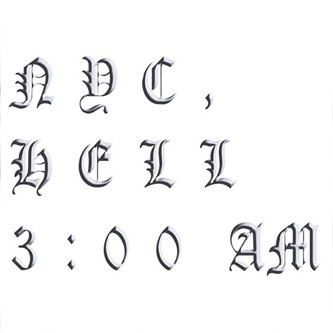Whether one found pain or pleasure in James Ferraro’s mysterious landmark Far Side Virtual, it was an unremittingly bleak black mirror, twisting horribly familiar source material stripped from the contemporary digital brandscape into a set of uniquely alien compositions for the modern age. That album signified Ferraro’s emergence from lo-fi and often extended cassette tape and CDR jams to become a perpetrator of hi-definition digital miniatures. However, since Far Side Virtual in 2011, follow-up Sushi and his Cold mixtape saw Ferraro veering away from abstract instrumentals and towards a wonky, glitchy sound that it was even possible to nod your head to. NYC Hell, 3:00AM is perhaps the logical conclusion to these shifts, finding Ferraro trapped in a modern personal hell of discordant vocals, introverted musings and ingenious sampling – not unlike this year’s The Redeemer by his onetime collaborator, Dean Blunt.
Absurd, leftfield electronic soloists are most definitely in – NYC Hell arrives in a month that’s seen the release of Oneohtrix Point Never’s bizarre Warp debut and Tim Hecker’s follow-up to the award-winning Ravedeath, 1972 – yet Ferraro’s gradual metamorphosis has made a most unlikely turn. While Lopatin and Hecker’s collagic albums continue their respective trips into the inhuman void, Ferraro (and Dean Blunt) are changing their scenery, and getting in touch with their very un-digital humanity, which is what makes NYC Hell so surprisingly compelling. It almost entirely disregards the Tim & Eric-like use of the bastardised on-screen version of reality that fuelled Far Side Virtual, in favour of a harsh and dystopic evocation of our own physical surroundings: the dull hum of the city is forever within earshot, and Ferraro’s own voice is always muffled in low-fidelity – two brazen universal truths of modernity.
Characteristically unsubtle, Ferraro opens with 20 seconds of a digital voice repeating "money, money, money", leading into an overture of ambient dissonance blending environmental sound with organic and digital drones. ‘Fake Pain’ follows, swiftly interjecting David Ruffin’s sampled God-like vocal performance from The Temptations’ ‘I Just Wish it Would Rain’ ("People this hurt I feel inside!"). In parallel to this, a low-bitrate beat stumbles along with a trailing, unquantised synth on its tail, and Ferraro’s own autotune-buggered voice muses aimlessly, snaking through the mix semi-discernibly, as on much of the album. Juxtaposing the theatrical impassioned agony of Detroit soul’s greatest with the downbeat bedroom mumbling of Ferraro’s inner voice, audibly captured in front of a laptop (space bar hits can clearly be heard) sets the scene for the album. This is universal pain and anguish, yet the bleakness of the urban landscape – in this case, New York – does everything to fuel a nihilistic and seemingly hopeless outlook. ‘Stuck 1’ presents the looped clatter of the street and a singing police siren alongside a cut up synth string bed that can never get off the ground, ultimately faltering and giving way to the city din.
The vast majority of the tracks aren’t, however, instrumental. After ‘Fake Pain’, autotune actually dissipates, and we more often than not hear Ferraro’s voice in all its imperfect glory. He quivers and hobbles around the notes, but never really hits them. His tone is an adopted facsimile of radio-friendly pop singing, characterising Ferraro the singer as something of an X Factor contestant type. Symbolically, there’s no other stereotype that better typifies the modern day hell in which Ferraro’s album resides: falsely confident, brainwashed by auto-tune and several dozen Now! compilations into assuming they can sing, drunk, stoned, wired in.
‘Cheek Bones’ is possibly the catchiest of the record’s crunk dirges, with Ferraro painfully spewing lyrical about cigarettes giving him cancer, and not wanting to get said cancer. The closing triptych of ‘Vanity’, ‘Irreplaceable’ and ‘Nushawn’ see the introversion take a gradual and menacing about turn. ‘Vanity’ loops and juts along, fleshing out an amateurish beat with a menagerie of lopsided samples presented as musical furniture. ‘Irreplaceable’ treads a submerged two-chord path for 6 full minutes, Ferraro pining once more and adding occasional glockenspiel notes. The climactic ‘Nushawn’ twists the album’s tale into something wholly more menacing. A choice cut from Patrick Bateman’s many stone cold lines in American Psycho and a looped slice of Bernard Hermann’s chilling Taxi Driver score underpin wordless vocal lines, autotuned out of recognition, and ultimately hinting at a murderous, psychotic climax in the life of NYC Hell‘s protagonist.
While still destined to divide his audience, with the excruciating and brilliant NYC Hell, 3:00AM, James Ferraro has quietly and calmly made some of the most affecting and intoxicating music of his career. Years of prolific drone explorations, the lessons learned on Far Side Virtual, and the near-pop sensibilities of Cold and Sushi all merge into something new here. Deceptively dense, this music unravels at a snail’s pace, and repeat listens also reveal the man’s sick skill with illogical hooks. The drone of the city, the neon lights of ubiquitous branding and the horror of a modern life spent rotting away behind a laptop are all captured perfectly by Ferraro’s uniquely harrowing surrealism.


